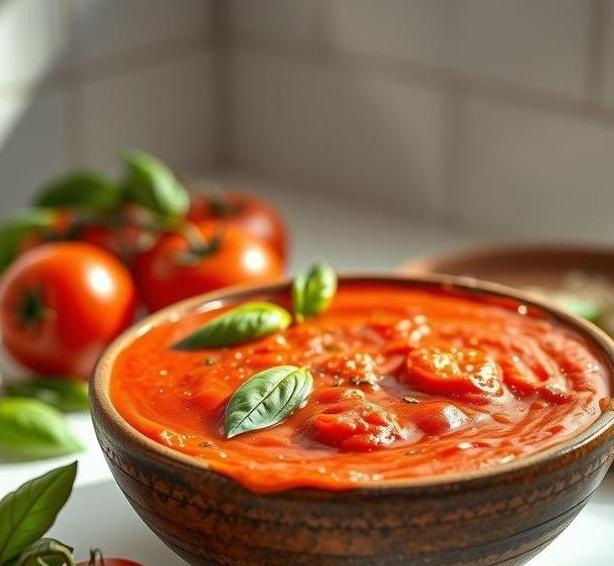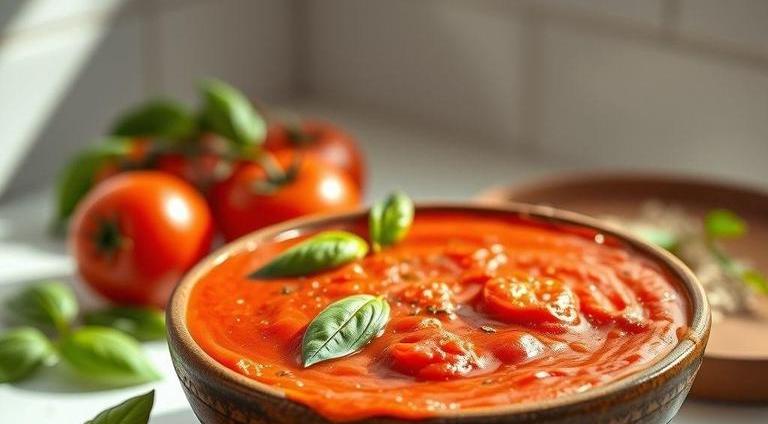Ah, pizza sauce – it’s the savory, tangy base that brings everything together, from your cheesy slice to your choice of toppings. Whether you make it yourself or buy it pre-made, pizza sauce is a staple in most households. But, like everything else in your kitchen, it has a shelf life. At some point, you’ll need to ask yourself: Can pizza sauce go bad? It’s not always clear when it’s time to toss it out, and sometimes, even a small jar of pizza sauce can last way longer than you think. So, let’s break down the truth about pizza sauce’s longevity and how to spot the signs that it’s time for it to go.
Can Pizza Sauce Go Bad?
Yes, pizza sauce can go bad. Though it’s a tomato-based sauce often containing ingredients like garlic, herbs, olive oil, and spices, it is still perishable. There are various factors that determine how long your sauce lasts: the type of sauce (store-bought or homemade), how it’s stored, and whether it’s been opened or not.
Let’s go into the nitty-gritty of it. Pizza sauce, particularly the kind that is purchased in jars, has preservatives, so it’s more resistant to spoiling than fresh homemade sauce. However, even pre-made sauces can develop issues once opened or if they’re not stored properly. Homemade pizza sauce, on the other hand, typically lacks preservatives and has a shorter lifespan, which makes it more susceptible to spoilage.
So, while pizza sauce is definitely designed to last for a while, you’ll want to stay on top of things. Once that jar is opened, its clock starts ticking.
Shelf Life For Pizza Sauce

Let’s get real about how long pizza sauce lasts. The shelf life of pizza sauce depends on whether it’s homemade or store-bought, and if it’s been opened.
For Store-Bought Pizza Sauce
- Unopened: As long as it’s sealed and stored properly (usually in a cool, dry place like your pantry), an unopened jar of pizza sauce can last 6 months to 1 year past its printed “best by” date. This is the ideal time to use it for optimal flavor and quality, though it might still be fine a little beyond that.
- Opened: Once the jar is opened, you typically have about 5 to 7 days to use it if it’s kept in the refrigerator. The sauce should be stored in an airtight container to prevent contamination from other foods and air exposure.
For Homemade Pizza Sauce
- Refrigerated: Homemade sauce doesn’t have the preservatives found in store-bought options, so it doesn’t last as long. Typically, you’re looking at about 3 to 5 days in the fridge.
- Frozen: If you make a big batch of pizza sauce, freezing it is a great option to extend its shelf life. You can store it for about 3 to 4 months in the freezer without much loss in flavor or texture.
Common Signs Of Spoilage
Now, let’s talk about the warning signs that your pizza sauce has gone bad. It’s always better to be safe than sorry, so if you notice any of the following signs, it’s time to toss it:
- Change in Color: Pizza sauce naturally deepens in color over time, especially when it’s exposed to air. However, if you notice a drastic shift to a dull, off color (like brown or grayish), this could indicate mold growth or the start of fermentation. While not always dangerous, it’s a sign that it’s not fresh anymore.
- Off-Smell: One of the easiest ways to tell if pizza sauce has gone bad is by giving it a sniff. Fresh pizza sauce smells rich and herby, with a slightly tangy tomato base. If it smells sour, rancid, or has an off odor, it’s a definite sign of spoilage.
- Mold Growth: If you see any visible mold-whether it’s green, black, or white-on the surface of your sauce, it’s definitely time to throw it out. Mold can sometimes form on the surface of sauces when they’ve been exposed to air or have been sitting in the fridge too long.
- Texture Changes: A watery or slimy texture can be a sign that the sauce has begun to spoil. A fresh pizza sauce should have a somewhat thick consistency, so if it’s looking too runny or slimy, it’s time to say goodbye.
- Fermentation Bubbles: If you notice bubbles or fizzing, that’s a sign of fermentation, meaning the sauce has started to spoil. You don’t want to eat anything that’s fermenting unless you specifically meant for it to!
How To Store Pizza Sauce?

Storing pizza sauce properly can extend its life and keep it fresh for longer. Here are some tips to help you store it the right way:
For Store-Bought Pizza Sauce
- Keep It in the Pantry (Unopened): Before opening, store the sauce in a cool, dry place. Your pantry or a cupboard away from heat sources (like the stove or direct sunlight) is ideal.
- Refrigerate After Opening: Once the jar is opened, immediately place it in the fridge, tightly sealed with its original lid. If you don’t have the lid anymore, transfer the sauce to an airtight container to minimize air exposure.
- Freezing: For longer storage, you can freeze pizza sauce in small portions. Use freezer-safe containers or ice cube trays to freeze it in single-serve portions. Just make sure to label it with the date so you can track how long it’s been stored.
For Homemade Pizza Sauce
- Refrigeration: As mentioned earlier, homemade sauce is best stored in an airtight container in the fridge. It should be used within 3 to 5 days, so don’t try to hold onto it too long.
- Freezing: If you’ve made too much sauce, freezing is a good option. Pour your sauce into ice cube trays, freeze it, and then transfer the cubes into a freezer bag. This allows you to defrost just the amount you need for a single pizza.
Expert Tips
- Use Glass Containers: When storing pizza sauce in the fridge, glass containers tend to be better than plastic ones because they don’t absorb odors and stains as easily.
- Portion Control: If you’re someone who buys large jars of pizza sauce, consider portioning out smaller amounts for quicker access and fewer wasted servings. You can even portion out some of the sauce into smaller containers and freeze them for future use.
- Check Before Using: Even if you’ve been good about storing your pizza sauce, always take a quick smell, look for mold, and check for texture before slathering it onto your dough. Better to be cautious!
- Add a Little Olive Oil: Adding a small splash of olive oil to your pizza sauce before storing it can help preserve its freshness and keep it from drying out in the fridge.
FAQs
Can Pizza Sauce Go Bad After Opening?
Yes, pizza sauce can go bad after opening. Once opened, the sauce is exposed to air and bacteria, which can lead to spoilage. It typically lasts 5-7 days in the fridge if properly stored.
How Can You Tell If Pizza Sauce Has Gone Bad?
Signs that pizza sauce has gone bad include an off or sour smell, discoloration (such as darkening or mold growth), and a change in texture (like separation or unusual thickness). If any of these occur, it’s best to discard the sauce.
How Long Does Pizza Sauce Last In The Fridge?
Pizza sauce usually lasts about 5-7 days in the fridge once opened. However, this can vary based on the brand, preservatives used, and storage conditions.
Can You Freeze Pizza Sauce To Extend Its Shelf Life?
Yes, you can freeze pizza sauce to extend its shelf life. When frozen, pizza sauce can last for up to 3-4 months. To freeze, place the sauce in an airtight container or freezer-safe bag, leaving space for expansion.
What Should I Do If My Pizza Sauce Develops Mold?
If pizza sauce develops mold, discard it immediately. Mold indicates that the sauce has been contaminated with bacteria or fungus, making it unsafe to consume.
Can Unopened Pizza Sauce Go Bad?
Yes, unopened pizza sauce can eventually go bad. While it has a longer shelf life, typically 1-2 years, over time, the flavor, texture, and overall quality can deteriorate due to storage conditions or expiration dates.
What Is The Best Way To Store Pizza Sauce?
The best way to store pizza sauce is in an airtight container in the refrigerator after opening. Make sure the container is tightly sealed to prevent air exposure. If unopened, store it in a cool, dry place, such as a pantry.
Does Pizza Sauce Expire If Left Out Overnight?
Yes, pizza sauce should not be left out at room temperature for more than 2 hours, as bacteria can start to grow. If left out overnight, it’s unsafe to eat, even if it looks and smells fine.
Can Pizza Sauce Spoil Before The Expiration Date?
Yes, pizza sauce can spoil before the expiration date if not stored properly or if there are issues with the sealing process. Signs of spoilage include an unusual smell, mold, or a change in texture.
What Is The Shelf Life Of Homemade Pizza Sauce?
Homemade pizza sauce typically lasts 5-7 days in the refrigerator. If you want to keep it longer, freezing it is an option. However, homemade sauce lacks preservatives, so its shelf life is shorter than store-bought varieties.